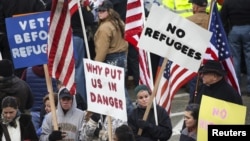As President Donald Trump rolled out a series of executive orders this week aimed at stepping up enforcement of immigration laws, a draft of another anticipated set of changes targeting foreigners began circulating in the media.
If signed as is, the presidential edict would gut the U.S. refugee program and halt entry to the U.S. for nationals from seven countries.
Several media outlets, including The Associated Press and the Los Angeles Times, have reported details of the changes obtained by their reporters. It was unclear how the reported changes would compare with the final executive order, but most of the policy points contained in the draft hew closely to Trump's campaign rhetoric and stated positions.
They would affect immigrants, visitors and refugees from majority-Muslim countries, with the aim — as the title of the executive order describes — of "Protecting the Nation from Terrorist Attacks by Foreign Nationals."
President Trump was asked about reports of the proposed changes in an interview with ABC News Wednesday. He did not confirm any details, but said the measures are aimed at improving U.S. security.
Albright alleges bias
In a call with reporters and members of the refugee resettlement community Thursday afternoon, former U.S. Secretary of State Madeleine Albright said the order would "directly harm our security interests."
She said the order would be "one of the worst things that has happened in a very long time as far as United States values are concerned," adding that there is "no question this order is biased against Muslims."
A version of the draft published online by the Times indicates the executive order, which the White House indicated might be signed this week, intends to:
— Suspend immigration and travel to the U.S. for nationals of Iran, Iraq, Libya, Somalia, Sudan, Syria, Yemen for 30 days.
— Institute a 120-day ban on refugee admissions, but allow certain exemptions for refugees of minority religions in their home countries.
— Cut the refugee ceiling for the current fiscal year from 110,000 to 50,000.
— Ban Syrian refugees indefinitely.
— Create "safe zones" in Syria and the "surrounding region" for displaced persons and refugees.
— Implement a biometric entry-exit system for travelers to the U.S.
— Suspend the Visa Interview Waiver Program and require in-person interviews for all nonimmigrant visas.
— Require the Department of Homeland Security to publish a report every six months on "foreign-born individuals" who have been "radicalized," commit acts of gender-based violence, or are charged with or convicted of terror-related offenses.
Timing unclear
How and when such policies would be implemented remained unclear. Refugee resettlement agencies in the U.S. had ramped up personnel in expectation of the ceiling established by the administration of President Barack Obama in September; those who work with refugees who have already arrived in the U.S. say their clients are concerned that family members will now be denied.
About 32,000 refugees have arrived since the beginning of the fiscal year on October 1.
Lavinia Limon, who heads the U.S. Committee for Refugees and Immigrants, said that in decades of working on refugee issues, "we've seen a lot of nonsense come and go."
"We presume we will see this go at some point," Limon added. "In the meantime, it's demoralizing."




